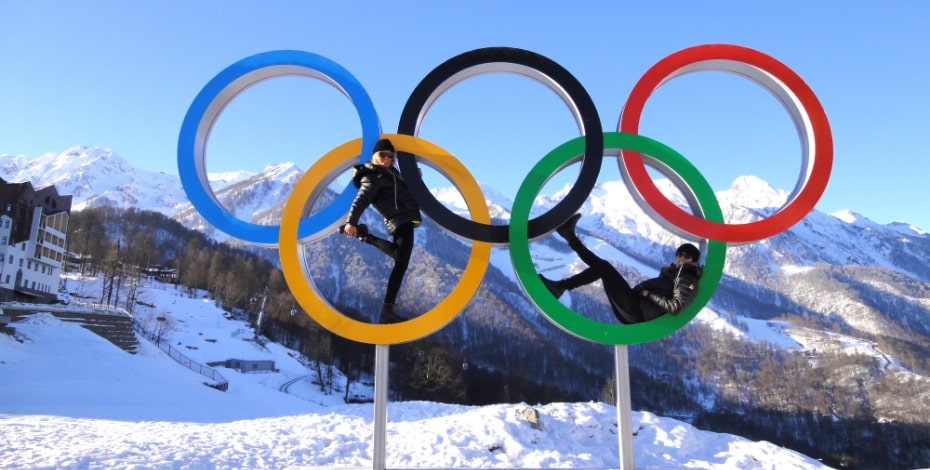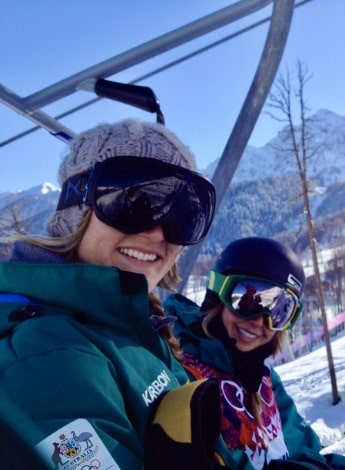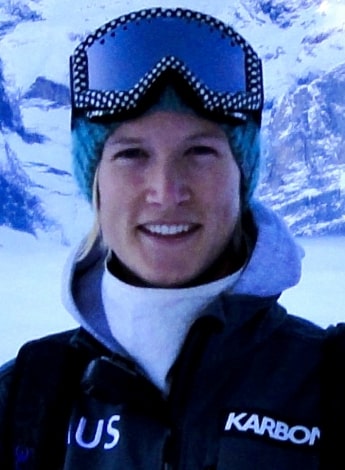
Cool career of chills, spills and thrills

Jess Cunningham was working with elite winter athletes all around the world, experiencing the highs and lows of helping top-tier sportspeople stay at the top of their game, when she went off-piste, professionally speaking, to start a family.
She speaks of the career break led her to question what to do with her extensive physiotherapy knowledge, her sporting contacts and her time.
After starting a family, Jess Cunningham came to the realisation that, for a period of time at least, she could no longer continue to travel internationally to work as a sports physiotherapist.
‘I began to ask myself, where do I fit as a mother, particularly with small children, in the sporting realm?
'That started me thinking, “How can I be useful with all these contacts and all this knowledge?”
‘I love being a mum and I want to be a present mum at home, but I wondered what I could still do that would be unique and of value to our profession. And that’s how the book idea started,’ she says.
Having spent the last few years running around after three children under four—a daughter and twin boys—Jess ‘tapped out’ of working face-to-face with elite athletes and started to look at the bigger picture of how she could have an impact.
After a decade of working with elite winter athletes, some of whom had experienced horrific, sometimes career-ending injuries, Jess realised she had been fortunate to witness some amazing (and clinically interesting) comeback stories.
The terrain and conditions experienced by winter athletes are harsh and unforgiving—a hotbed of knee and ligament injuries that required Jess to employ some serious rehabilitation work to get athletes back competing.
Someone should write a book that shares those athletes’ stories, she thought.
How it all began
Noosa, on Queensland’s Sunshine Coast, always struck Jess as an odd place to be the beginning of her work in the field of winter sports.
In 2007, however, the region famed for its pristine sandy beaches and water sports culture became a temporary base from which to pursue her passion for sports physiotherapy.
Having developed a love of the ocean while growing up in Melbourne, Jess chased warmer waters to Queensland and worked at a private practice in Noosa with the then physiotherapy coordinator for the Olympic Winter Institute of Australia, Peter Hogg.
At that time, however, Australian investment in physiotherapy for the elite winter sports Jess was interested in (namely snowboard half-pipe) was low.
Realising that Noosa would not provide the level of exposure to winter athletes she sought, Jess packed up and headed to the closest hub of professional winter sports in the Southern Hemisphere that she could find—Wanaka, New Zealand.
Joining the team at private practice Wanaka Physiotherapy, Jess would have clients from the nearby terrain park quite literally falling at her feet.
‘Snowpark’ was the training ground for freestyle skiing and snowboarding, with world-class jumps, rails and halfpipes. Working inside the on-hill physiotherapy clinic, Jess could look up to see it all.
‘The clinic sat at the bottom of the hill and I would look up at these massive terrain park features and see very large impacts and injuries happen—and they would come down the hill, straight to me.
'I’d see anterior cruciate ligament (ACL) injuries happening most days, sometimes multiple times,’ Jess says.
‘Along with lots of other interesting traumas. You’d get to assess these knees immediately and then follow them up as the patients went down to the clinic that evening and completed their rehab in town in Wanaka.
‘Working in private practice in Australia, I just didn’t see acute trauma on the scale that I did in New Zealand.
'To suddenly be in the thick of it was quite eye-opening and formative for my start in winter sports,’ Jess says.
‘Everybody who was [significantly involved] would go to New Zealand at that time of year. You became embedded in the winter sports scene.

Jess Cunningham does physio consults on the chair lift with Anna Segal at the Sochi Winter Olympics.
'Then I started travelling in the Northern Hemisphere with the Australian team. I also did stints with the New Zealand team and some of the American big name athletes as well.’
The international winter sports circuit was a long way from the Melbourne winters Jess had known growing up and while studying physiotherapy at the University of Melbourne, from which she graduated in 2005.
While she had always had a passion for sport, even playing national-level volleyball as a junior (‘I was an injured sporty kid’), Jess never wavered in her ambition to become a physiotherapist.
‘I was always the injured kid for lots of reasons and that’s probably what started me thinking that I’d like to be able to fix myself rather than having other people fix me.
'So that planted the seed of becoming a physiotherapist and then things developed from there,’ Jess says.
‘At the start of their degrees many physios think of becoming sports physios, but in reality that is a very tiny piece of the whole pie.’
Targeted placements as an undergraduate saw Jess initially travel to Hawaii for a professional surfing pipeline event, but at that time the surfing tour lacked the professionalism it has today and she came away more committed to winter sport than to surfing.
She credits the University of Melbourne with setting her up well in her chosen profession by offering great placements in real-life working environments.
‘You still had to do your hospital placements but for the elective placements I was quite savvy and I was already networking within the winter sports world to work out who I needed to work with,’ Jess says.
‘I picked the people working in the area I wanted to go into and went and worked alongside them. And that seemed to work.’
One intact ACL between them
Jess says there are two athletes in particular whose ACL injury experiences stand out in her mind, Australian slopestyle skiers Anna Segal and Russ Henshaw.
As their physiotherapist in the lead-up to the 2014 Winter Olympics in Sochi, Russia, Jess found that the ACL injury journey of each athlete challenged her like no other ACL injury she had worked on.
‘Anna and Russ both successfully competed at the Sochi Winter Olympics in the ski slopestyle event—arguably one of the biggest slopestyle courses made for competition at that time—with just one intact ACL between them. One. Not four. Just one,’ Jess says.
‘The lone functioning ACL belonged to Anna’s left knee, the knee she had been rehabilitating heavily for the year preceding the Games, after sustaining a significant chondral cartilage injury in a ski crash.
'Three weeks prior to departing for Sochi, and five weeks before the start of competition, Anna had blown her “good” right ACL for the second time.
‘Russ had been skiing for a year without his right ACL after sustaining a re-rupture at the 2013 Winter X-Games.
'With no instability episodes, a limited time frame before the next Olympics and awareness of a Norwegian slopestyle skiing friend who was competing successfully without an ACL, Russ had decided to go down the nonsurgical pathway.
'He was having good success, had returned to competitive skiing and was landing on the podium without the ACL.
'However, at the 2014 Winter X-Games, three weeks out from competing at Sochi, Russ came up short on one of the jumps and ruptured his “good” left ACL.’
Jess called on all her physiotherapy knowledge to help them, including her training as an APA Sports and Exercise Physiotherapist, which she became in 2012.
‘I had jammed titling in very quickly between 2010 and 2011. I was already working with the Australian and New Zealand national teams and travelling with them for the snowboarding and skiing.
'The Olympic pathway was becoming a thing by then, although still in its infancy, and I realised that to work at that level I was going to need titling,’ she says.
Jess continued to work with elite athletes, spending time with the Australian Sailing Team and AFL’s GWS Giants until she and her partner Nick, a French engineer, decided to start a family. This meant putting physiotherapy into the background for a time.

Jess Cunningham is a physio who loves the snow.
However, Jess says the memories of her professional experiences never waned. They would eventually form the basis of her recently released book, POP: When sport brings us to our knees.
‘My daughter was born at the end of 2018. By the start of 2019, she was a terrible sleeper. She was a healthy baby, yes, but I was very sleep deprived and apparently my brain doesn’t switch off,’ Jess says.
‘My mind went into hyperdrive. I was so fatigued but I kept asking myself, “What am I going to do?” All these weird and wonderful ideas were popping up, one of which was the book. I sat on that idea for a long time, probably three to six months, before putting the feelers out.
‘All the time I was thinking, “Obviously, I’m not a writer; I’ve never been a writer; I can’t do it.” But the feedback I kept getting from those I asked was that it was a great idea.’
Around the time her daughter turned one, Jess conducted her first official interview for the book and the project snowballed from there.
For more than three years, Jess worked on the book at weird times of the day and night, transcribing and editing all the in-depth interviews with athletes involved in the project.
As though writing a book and raising a family weren’t enough, Jess also decided to throw retraining as a women’s health physiotherapist into the mix.
‘There’s a lot of talk surrounding women’s health in sport at the moment. It’s an exciting time, and now I’m looking to combine my skills in women’s health and elite sport, both clinically and with formal research,’ Jess says.
Reflecting on her career, Jess says that there have been a lot of highlights, particularly during her years spent working in winter sports.
But little compares, she says, to the incredible feeling of being able to treat a patient—be it at an elite sporting level or in the community—and get them back on their feet.
‘I think every day in physio you have a highlight because you get to make people feel better.’
Pop a copy in your basket
Jess Cunningham has practised extensively as a physiotherapist in elite and professional sporting environments, both in Australia and overseas.
Her clients have included numerous freestyle ski and snowboard Winter Olympians and X-Games champions from Australia, New Zealand and the USA; Olympic sailors; professional footballers; and a host of recreational and aspiring athletes.
Jess lives by the beach on New South Wales’s South Coast with her partner Nick, a French engineer. She spends her time chasing after her energetic daughter Maeva and twin boys, Leo and Lucas, and pursuing her own salty and snowy adventures.
‘Nick and I both love the ocean and we love being active and healthy. He’s one of those annoying people who is good at everything, but probably not quite as driven as I am,’ Jess says.
And Jess is one driven individual. In an attempt to address Australia’s ACL reconstruction rate, the highest in the world, Jess Cunningham has compiled the stories of 13 elite Australian athletes, who share and reflect on their ACL injury journeys in her book POP: When sport brings us to our knees.
The book, released in August this year, includes an introduction and an afterword section presenting the latest research on ACL injury, reconstruction and recurrence as well as discussing both conservative and surgical management of ACL tears.
‘The purpose of this book is not to argue that conservative or surgical management is the better option, but rather to provide a resource, offering inspiration and education about the rehabilitation journey ahead for those who have suffered an ACL injury,’ Jess says.
‘The common phrase heard from all the athletes interviewed for this book was “I wish something like that had existed when I was going through it all”. Now it does.’
As well as being a valuable resource for physiotherapists and for athletes and other patients with ACL injuries, the book aims to raise awareness and funds for the Sporting Chance Foundation, which helps improve access to sports medical care for aspiring Indigenous Australian athletes.
Ten per cent of the proceeds from the sale of the book will be donated to the Foundation.
Jess credits her family with helping her make the time to complete her passion project, the writing of her book POP: when sport brings us to our knees, and she hints that she may yet write another book in future. Watch this space.
POP: When sport brings us to our knees is available at all good book retailers. Alternatively, click here to purchase it online.
© Copyright 2024 by Australian Physiotherapy Association. All rights reserved.





